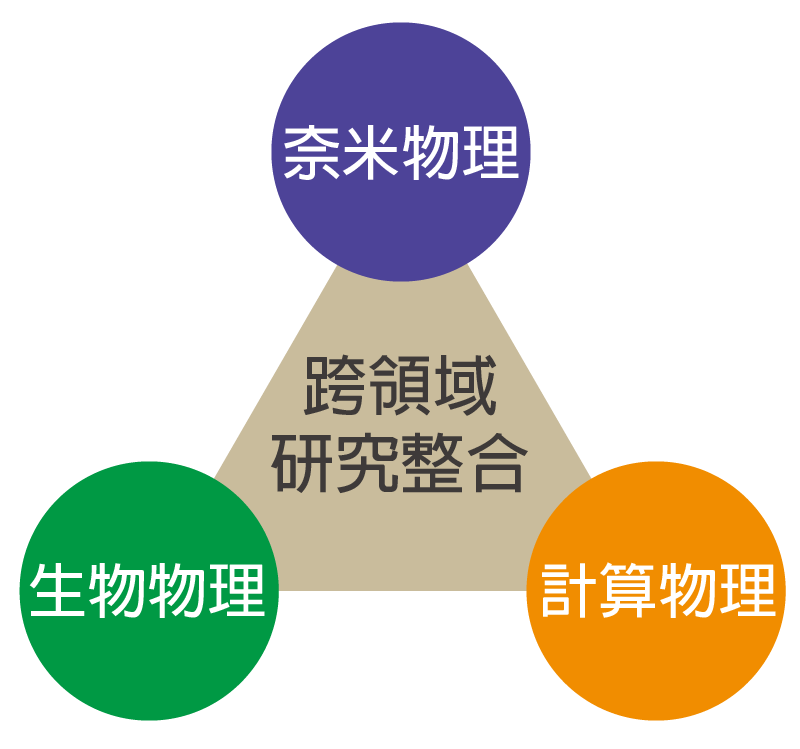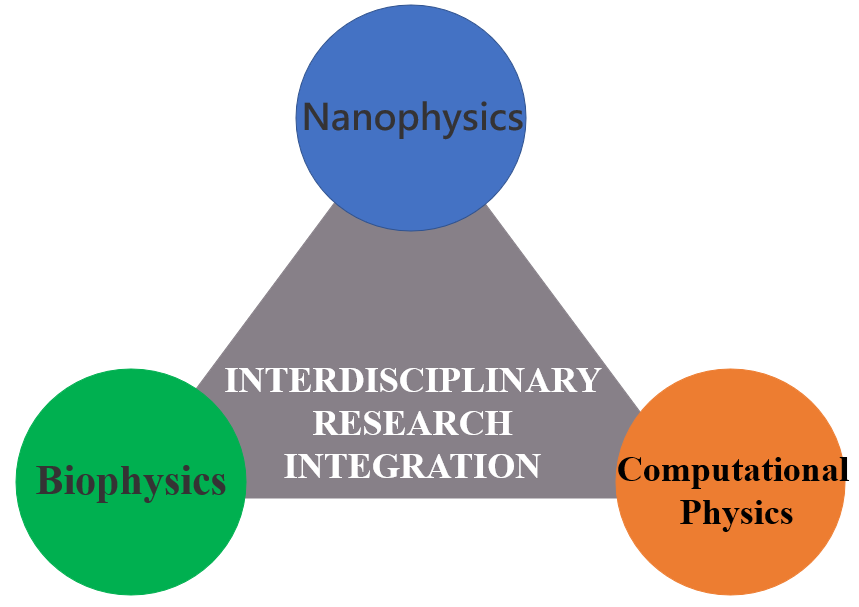跨領域研究群 Interdisciplinary research group
本系跨領域研究群
系所研究的合作與整合,除了各教師獨立研究之外,亦顧及實驗與理論的相互支援與配合,本系將每位老師的研究專長整合發展為三個跨領域研究群。這些領域的重要性在於它們不僅包含了傳統物理的基礎研究,更和廿一世紀新興的科技─生命科學、環境科技、和海洋科技有很重要的關聯性;其不僅可以提升國內此類科學的研究發展,而且可符合本校整體、務實科技發展之理念與發展方針;這些領域與本校其他的系所,例如應用數學、化學、生命科學、材料科學、資訊工程、和電機工程等,也有極密切的關聯與整合特性。
《奈米物理研究群》
探討奈米科技中最直接的問題,材料系統越來越小,位於表面的原子比例越來越高,所以表面的性質更為重要,而位於表面的缺陷,對於奈米粒子的物理、化學性質影響甚大。探討奈米尺度下的磁性與光學特性研究及其前瞻性的光學應用。
教師專長包括:奈米生物技術、介金屬及半導體材料熱電性質、奈米技術、表面物理、半導體物理、凝體物理等。
《理論與計算物理研究群》
理論物理的研究是利用數學與邏輯的語言來探討自然界中潛在的物理法則,並透過理論或模型的建構去解釋。計算物理的研究是以大型的模型建立與模擬計算,結合可用的設備,形成巨大的計算資源,並利用平行和分散式計算演算法,來解決大型的科學計算問題。以計算物理研究方法探討材料特性及各式應用研究;探討原子,次原子基本性質與其多體系統現象。
教師專長包括:宇宙論、統計物理場論、理論核物理、計算物理、計算材料等。
《生物物理研究群》
物理學兼具有極微觀及極巨觀之偵測技術,並有完備的學理基礎與模型,用以深入生物分子世界,探索生物體系,將有突破性的發展,除學術上的研究突破外,並可以此基礎開發新的生物技術,提升本國生物技術之層次,以奠立生命科學領先國之基礎。研究奈米生物系統、催化反應機制及生物質譜的分析。
教師專長包括:光譜學的生物及醫學應用、生物物理、生物質譜學等。

Interdisciplinary Research Groups
In addition to individual faculty research, our department emphasizes collaboration and integration across theoretical and experimental studies. We have organized our faculty's expertise into three interdisciplinary research groups. These areas not only cover fundamental research in traditional physics but also closely connect with 21st-century emerging technologies such as life sciences, environmental science, and marine technology. This integration not only advances scientific research in Taiwan but also aligns with the university's pragmatic approach to technological development. Moreover, these fields are closely related to and integrated with other departments such as Applied Mathematics, Chemistry, Life Sciences, Materials Science, Computer Science, and Electrical Engineering.
Nanophysics Research Group
This group explores fundamental issues in nanotechnology. As material systems become smaller, the proportion of surface atoms increases, making surface properties more critical. Surface defects significantly impact the physical and chemical properties of nanoparticles. The group also investigates magnetic and optical properties at the nanoscale and their forward-looking optical applications.
Faculty expertise includes: Nanobiotechnology, thermoelectric properties of intermetallic and semiconductor materials, nanotechnology, surface physics, semiconductor physics, condensed matter physics, and more.
Theoretical and Computational Physics Research Group
Research in theoretical physics uses mathematics and logic to explore fundamental physical laws in nature through the construction of theories and models. Computational physics focuses on building large-scale models and simulations, using available resources and leveraging parallel and distributed algorithms to tackle large-scale scientific computing problems. This group studies material properties and diverse applications through computational methods, and investigates atomic and subatomic properties and many-body phenomena.
Faculty expertise includes: Cosmology, statistical field theory, theoretical nuclear physics, computational physics, computational materials science, and more.
Biophysics Research Group
Physics offers tools for both extremely microscopic and macroscopic detection, supported by strong theoretical foundations and models. These strengths enable in-depth exploration of biological molecular systems and organisms, leading to breakthroughs in both academic research and the development of new biotechnologies. This group focuses on nanoscale biological systems, catalytic reaction mechanisms, and biological mass spectrometry analysis.
Faculty expertise includes: Spectroscopy in biomedical applications, biophysics, biological mass spectrometry, and more.

